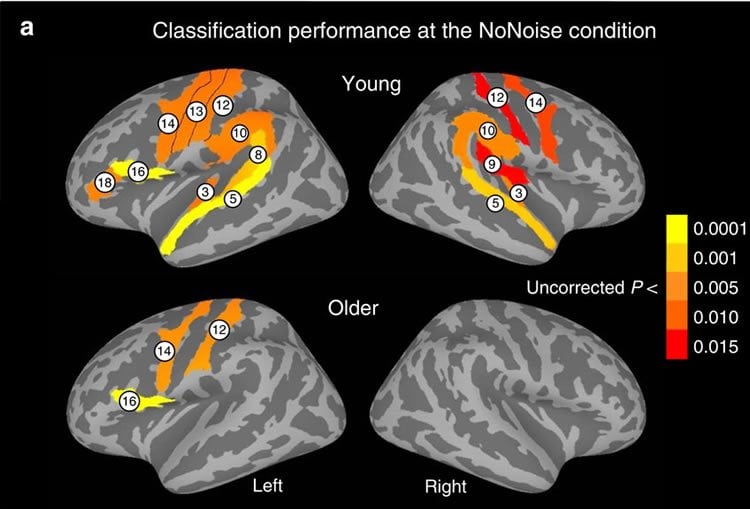Summary: Researchers have identified a specific part of the brain that older adults use to differentiate speech sounds in background noises.
Source: Baycrest Center for Geriatric Care.
Researchers have pinpointed the specific part of the brain that older adults rely on to differentiate speech sounds in background noise, which could revolutionize the treatment of hearing loss.
As people age, their peripheral and central auditory system (areas of the brain that help to intake and interpret sound) decline in function and plugging into other parts of the brain is needed to compensate, according to Dr. Claude Alain, senior investigator of the study and Assistant Director of the Rotman Research Institute at Baycrest Health Sciences.
To adapt for hearing loss, the speech motor area of the brain’s frontal lobe steps in to help an older adult interpret someone talking in a noisy room, according to a study published today in the Nature Communications journal.
“Prior research found that there’s a change in the brain and how it acts when older adults listen to speech and noise, but people didn’t know the nature of this change,” says Dr. Alain. “Our study was able to show that we appear to tap into the speech motor areas, regions of the brain that are important for speech articulation and production, and use that information to identify speech embedded in noise.”
The study analyzed the brain activity of 16 young and 16 older adults and their ability to identify syllables, while the level of noise changed in the background.
This finding is important because it paves the way for programs to be designed to assist seniors with hearing loss and to adapt the way hearing aids are developed. Significant hearing loss is one of the most common chronic health conditions in older adults that affects 90 per cent of seniors who are 80 years and older. A loss of hearing greatly affects an older adult’s ability to socialize and their quality of life.

“If you have impaired hearing, you try to correct that with a hearing aid or assistive listening devices, but it can be difficult to tweak the mechanical aspect to zoom in on a person’s voice,” says Alain. “By showing there are other brain areas that affect hearing you can design training programs that target these brain areas to see if we can improve their use.”
This research was conducted with support from a five-year Canadian Institutes of Health Research grant that allowed Dr. Alain and his team to create a prototype of a new auditory training program aimed at helping older people maintain their ability to separate speech from background noise.
“The grant supported research that helped us understand how we perceptually comprehend speech’s sound and how that changes as we get older,” says Dr. Alain.
Dr. Alain is now looking for additional funding to continue testing this prototype, which incorporates additional visual or location cues provided by a speaker.
Funding: This work was supported by the Canadian Institutes of Health Research.
Source: Jonathan MacIndoe – Baycrest Center for Geriatric Care
Image Source: This NeuroscienceNews.com image is credited to the researchers/Nature Communications.
Original Research: Full open access research for “Increased activity in frontal motor cortex compensates impaired speech perception in older adults” by Yi Du, Bradley R. Buchsbaum, Cheryl L. Grady and Claude Alain in Nature Communications. Published online August 2 2016 doi:10.1038/ncomms12241
[cbtabs][cbtab title=”MLA”]Baycrest Center for Geriatric Care. “Part of Brain That Compensates for Hearing Loss in Elderly Identified.” NeuroscienceNews. NeuroscienceNews, 4 August 2016.
<https://neurosciencenews.com/hearing-loss-aging-frontal-lobe-4784/>.[/cbtab][cbtab title=”APA”]Baycrest Center for Geriatric Care. (2016, August 4). Part of Brain That Compensates for Hearing Loss in Elderly Identified. NeuroscienceNews. Retrieved August 4, 2016 from https://neurosciencenews.com/hearing-loss-aging-frontal-lobe-4784/[/cbtab][cbtab title=”Chicago”]Baycrest Center for Geriatric Care. “Part of Brain That Compensates for Hearing Loss in Elderly Identified.” https://neurosciencenews.com/hearing-loss-aging-frontal-lobe-4784/ (accessed August 4, 2016).[/cbtab][/cbtabs]
Abstract
Increased activity in frontal motor cortex compensates impaired speech perception in older adults
Understanding speech in noisy environments is challenging, especially for seniors. Although evidence suggests that older adults increasingly recruit prefrontal cortices to offset reduced periphery and central auditory processing, the brain mechanisms underlying such compensation remain elusive. Here we show that relative to young adults, older adults show higher activation of frontal speech motor areas as measured by functional MRI during a syllable identification task at varying signal-to-noise ratios. This increased activity correlates with improved speech discrimination performance in older adults. Multivoxel pattern classification reveals that despite an overall phoneme dedifferentiation, older adults show greater specificity of phoneme representations in frontal articulatory regions than auditory regions. Moreover, older adults with stronger frontal activity have higher phoneme specificity in frontal and auditory regions. Thus, preserved phoneme specificity and upregulation of activity in speech motor regions provide a means of compensation in older adults for decoding impoverished speech representations in adverse listening conditions.
“Increased activity in frontal motor cortex compensates impaired speech perception in older adults” by Yi Du, Bradley R. Buchsbaum, Cheryl L. Grady and Claude Alain in Nature Communications. Published online August 2 2016 doi:10.1038/ncomms12241






